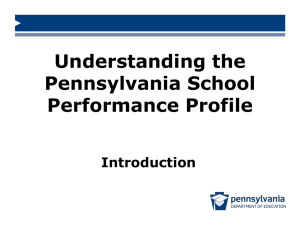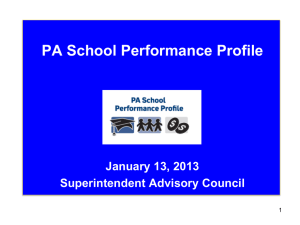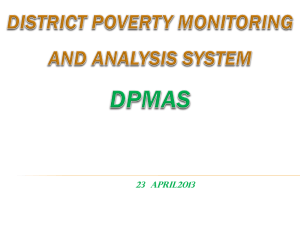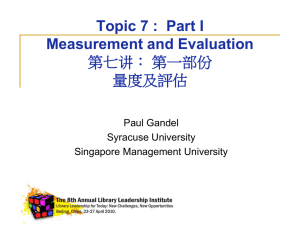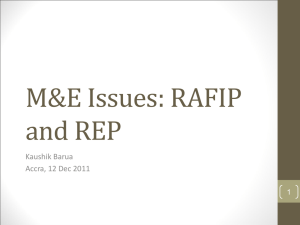School Performance Profile Update
advertisement
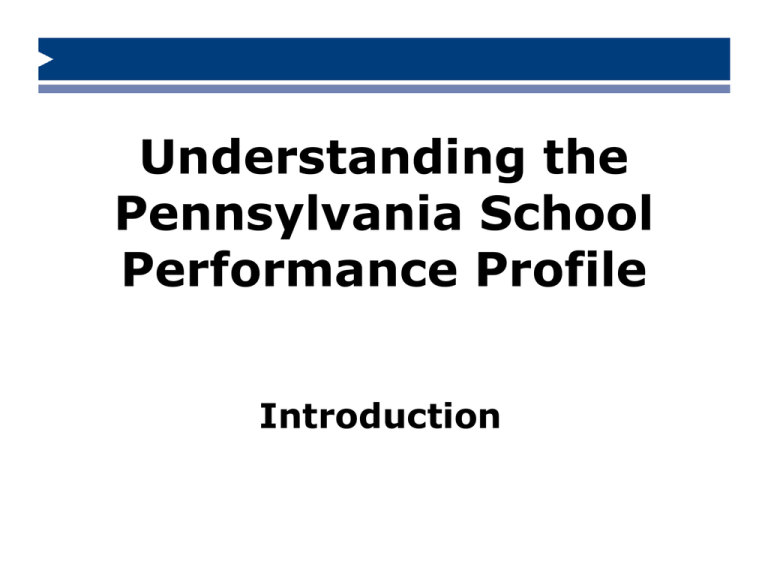
Understanding the Pennsylvania School Performance Profile Introduction Purpose The PA School Performance Profile is designed to: Provide a building level academic score for teachers as part of the Educator Effectiveness System (15%) Inform the public of the performance of each school, comprehensive career and technical center, cyber charter and charter school in Pennsylvania Provide parents and taxpayers performance measures for the school/district of residence, 2 neighboring schools/districts and schools/districts across the state > 2 Purpose For LEAs, the School Performance Profile will serve multiple purposes: Inform and guide goal setting, resource allocation, and targets for improved student achievement Communicate performance to various constituencies 3 Compare performance to other schools Encourage implementation of best practice > 3 Demographic Fast Facts asi • District and School – Demographics – Career and Technical Center – Supporting Intermediate Unit – Percent Enrollment by Ethnicity – Percent Enrollment by Historically Low Performing Students 5 – Link to Supplemental Reports > 5 Academic Performance Score • The score for a school is based upon multiple measures which define high performing schools. • Many data elements are combined to create the academic score. These elements are categorized into five areas. 6 > 6 Building Level Score Data Components • Indicators of Academic Achievement (40%) • Indicators of Closing the Achievement Gap – All Students (5%) Indicators of Closing the Achievement Gap – Historically Low Performing Students (5%) • Indicators of Academic Growth – PVAAS (40%) • Other Academic Indicators (10%) 7 • Extra Credit for Advanced Achievement > 7 Building Level Score Indicators of Academic Achievement Indicators of Academic Achievement 40% • PSSA/Keystone Performance • Industry Standards-Based Competency Assessments • Grade 3 Reading Proficiency • SAT/ACT College Ready Benchmarks 8 > 8 Closing the Achievement Gap Closing the Achievement Gap Based upon progress in moving All Students all students to proficiency (5%) (defined as 100%) Historically Low Performing Students (5%) Based upon progress in moving historically low performing students to proficiency (defined 9 as 100%) • Students with Disabilities • English Language Learners • Economically Disadvantaged > 9 Closing the Achievement Gap Sample Calculation: • Proficient/Advanced = 40% • Gap between 40% and 100% is 60% • Must close one-half of gap over a 6-year period • Gap closure = 30% over 6-years 1 0 • Annual goal = 5% per year (cumulative) > 10 Building Level Score Indicators of Academic Achievement Indicators of Academic Growth / PVAAS 40% PVAAS Growth Index • Math • Reading • Science 1 • Writing 1 > 11 Indicators of Academic Growth -PVAAS Growth Index 3 or higher Score 100 2 90 1 80 0 75 -1 70 -2 -3 or lower 1 2 60 50 > 12 Building Level Score Indicators of Academic Achievement Other Academic Indicators 10% • • • • Cohort Graduation Rate Promotion Rate Attendance Rate Advanced Placement or International Baccalaureate Diploma, or Dual 1Enrollment 3 • PSAT/PLAN Participation > 13 Building Level Score Indicators of Academic Achievement Credit for Advanced Achievement • • • • • • Percent PSSA Advanced – Math Percent PSSA Advanced – Reading Percent PSSA Advanced – Science Percent PSSA Advanced – Writing Percent Advanced-Keystone Percent Advanced – Industry Standards-Based Competency Assessments • 3+ on AP Exams > 14 Scoring Protocols • Maximum Overall Score = 100 – Maximum possible points may be reduced based upon Insufficient Sample or Not Applicable • Credit for Advanced Achievement (up to 7 1 5 points in addition to maximum score) > 15 For More Information • • Face-to-face sessions will provide LEAs with a sound understanding of the SPP, including the recent changes made in the building level scoring. It is critical that educators have a deep understanding of the SPP and the elements and factors that contribute to the score. If you register for a session and the training is rescheduled, you will be notified via email. Face to face sessions have a maximum capacity of 75 participants per location. Registrations will be accepted until capacity is reached. May 23 - PaTTAN-Harrisburg (On Site) 8:00 - 10:00 - AM Session To register: http://www.solutionwhere.com/tiu11/cw/showcourse.asp?2255 May 23 - PaTTAN-Harrisburg (On Site) 10:30-12:30 - AM Session 1 6 To register: http://www.solutionwhere.com/tiu11/cw/showcourse.asp?2255 > 16 For More Information • For more information on the PA School Performance Profile, log onto http://www.pdesas.org/ and register as a member of the PA School Performance Profile Professional Learning Community (PLC). • PLC includes PP, handouts, links1to SPP 7 video segments, and archived SPP webinar. • Address questions to ra-paprofile@pa.gov > 17

